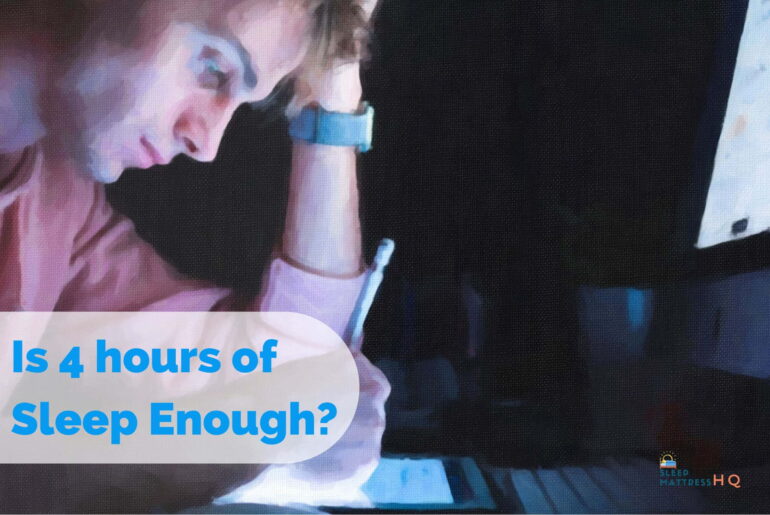Disclosure – We rely on reader support to run SleepMattressHQ.com. If you purchase products using our links, we may earn a commission. Click here to read about our process.
No, 4 hours of sleep is not enough for most adults to function optimally. Adults typically need 7 to 9 hours of sleep per night.
The quantity and quality of sleep play a crucial role in many aspects of our mental and physical health, including cognitive function, mood regulation, immune system function, and overall health.
Consistently getting less sleep than recommended can lead to sleep deprivation, which negatively impacts our daily performance, concentration and memory.
Effects of sleep deprivation are also associated with an increased risk of various health problems, including obesity, cardiovascular disease, diabetes, and mental health disorders.
While individual sleep needs may vary slightly, it is generally recommended to prioritize getting adequate sleep to support overall health and well-being. If you consistently have sleep issues, it is important to assess your sleep habits and prioritize healthy sleep practices to ensure you are getting enough rest.
Sleep is a natural restorative process of body and mind. For a person to be physically and mentally healthy, they must get enough sleep.
A person with poor sleep quality may suffer from sleep disorders or other medical conditions that keep him from getting enough sleep. Sleep deprivation can lead to depression, anxiety, heart disease, and stroke.
It is common for people to cut down on their sleep time in order to increase their productivity or to meet lifestyle demands. There is a lack of awareness of the impact of sleep on cognitive abilities and the deterioration of quality of life. Some people work late, spend too much time on screens, or have babies to care for.
Regardless of the reason, it is unhealthy for your overall health. You may feel lower energy levels, lack concentration, irritable, and have difficulty getting through the day. You may also be at risk for long-term health problems such as obesity, diabetes, and high blood pressure.
What happens when you sleep for 4 hours?
Lack of sleep can have a variety of short-term and long-term effects on your health.
Short-term effects can include feeling groggy, irritable, and unfocused, as well as having difficulty concentrating, memory problems, and decreased alertness. Stress levels may also increase and you may have difficulty performing routine tasks.
Furthermore, you may experience difficulty falling asleep and staying asleep, resulting in further sleep loss and disrupting the circadian rhythm.
In the long term, lack of sufficient sleep can cause a variety of health problems, including increased risk for weight gain, heart disease, stroke, diabetes, insomnia, and depression. It can also weaken your immune system, making you more prone to sickness and infections.
In addition, it can reduce your life expectancy because it puts strain on your body and can accelerate the aging process.
Common FAQs related to Insufficient Sleep
Is 4 hours of Sleep enough for one day?
4 hours of sleep is not enough even for a day. You may feel it is a matter of one day and you can go back to a normal sleep pattern the next day. The sleep cycle will go for a toss. It takes four days to recover from just one hour of sleep loss.
Is 4 hours of Sleep enough for a Student?
No, 4 hours of sleep is not sufficient for a teenage student. It is common for students to reduce their sleep to devote more time to studying. Others reduce their overall sleep during exams but this can affect their performance the next day and their ability to recall information in the exam.
Are 4 hours of Sleep enough once a week?
No, skipping quality sleep even once a week is not recommended. One night of inadequate sleep can create sleep debt that can take 4 days to a week to recover. If starts happening frequently, getting back on track will take more time if you have been awake for an extended period.
Recommended Sleep Duration as per Age
The following table shows the recommended sleep for each age group according to the National Sleep Foundation (US).
| Age | Recommended | May be appropriate | Not recommended |
|---|---|---|---|
| Newborns 0-3 months | 14 to 17 hours | 11 to 13 hours 18 to 19 hours | Less than 11 hours More than 19 hours |
| Infants 4-11 months | 12 to 15 hours | 10 to 11 hours 16 to 18 hours | Less than 10 hours More than 18 hours |
| Toddlers 1-2 years | 11 to 14 hours | 9 to 10 hours 15 to 16 hours | Less than 9 hours More than 16 hours |
| Preschoolers 3-5 years | 10 to 13 hours | 8 to 9 hours 14 hours | Less than 8 hours More than 14 hours |
| School-aged Children6-13 years | 9 to 11 hours | 7 to 8 hours 12 hours | Less than 7 hours More than 12 hours |
| Teenagers14-17 years | 8 to 10 hours | 7 hours 11 hours | Less than 7 hours More than 11 hours |
| Young Adults18-25 years | 7 to 9 hours | 6 hours 10 to 11 hours | Less than 6 hours More than 11 hours |
| Adults26-64 years | 7 to 9 hours | 6 hours 10 hours | Less than 6 hours More than 10 hours |
| Older Adults≥ 65 years | 7 to 8 hours | 5 to 6 hours 9 hours | Less than 5 hours More than 9 hours |
References:

